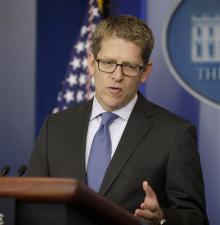
White House press secretary Jay Carney gestures during his daily news briefing at the White House in Washington, Thursday, Sept., 26, 2013. (AP Photo)
(CNSNews.com) – White House Press Secretary Jay Carney said “absolutely,” he would sign up for insurance on one of the new Obamacare exchanges — “if I did not have employer-provided health insurance.”
“I would absolutely enroll,” Carney said on Thursday. “It would be more affordable,” he added.
But along with affordability comes a limited choice of health care providers, a reporter noted.
“No question,” Carney responded. “The bronze plan, lower-cost plans, are going to be more limited in the services they provide and the benefits they provide than better — higher-cost plans, you know, silver, gold, platinum, whatever. I’m — that may be true and is often true in employer-based health insurance,” Carney said.
“For those families who do not have insurance and cannot afford insurance currently, to have available to them an option that they can afford, that would provide insurance coverage that they do not have, how could that be described as anything but a good thing?
“So there’s no question that affordable health care plans, the less expensive ones, are going to be more limited in their benefits. But they all meet minimum standards, and they all beat the stuffing out of the alternative, which is no insurance, which is just using emergency rooms around your city or county, hoping to deal with your child’s asthma problem.”
Carney repeated that “if you have insurance provided by your employer that you like, nothing changes for you” under Obamacare. He called it “a fact often either ignored or mischaracterized by critics.”
And with the six-month Obamacare enrollment period starting on Oct. 1, Carney could not define what the White House would consider a successful turnout: “I’ll have to — I don’t know that I have that figure. Somebody might — our health care expects might have a target figure for what — I think HHS has put out information about, you know, what they’re looking in terms of how many people they’re expecting to enroll. But I don’t have that available to me right now.”
Asked about criticism that many businesses are cutting workers’ hours to avoid Obamacare mandates, Carney said, “There’s ample data that refutes that.”
“In fact, there was some assertion from the restaurant industry…that that was the case, and then the data came out that showed that the growth in jobs in that industry has been particularly concentrated in full-time employment. So there’s just not the data to back that up.”
Carney insisted that “there’s an advantage for a company to provide health insurance to its employers.”
But, as the Heritage Foundation noted: Obamacare’s employer mandate forces all employers with more than 50 full-time employees, defined as those who work at least 30 hours a week, to provide health insurance for employees or pay a $2,000 penalty for each employee after the first 30 workers. This creates an incentive for businesses to avoid both the penalty and cost of coverage by hiring part-time employees instead of full-time employees, since businesses will not be penalized for failing to provide health insurance to part-time employees.
Just before the July 4 holiday, the Obama administration quietly suspended that employer mandate, but only for one year. Some lawmakers say the individual mandate — which requires every American to purchase health insurance or pay a fine — should be suspended for a year as well.
But conservatives want the entire law scrapped, not suspended; and they say a Senate vote on Friday is the last, best chance to stop it before it starts.
Source material can be found at this site.









